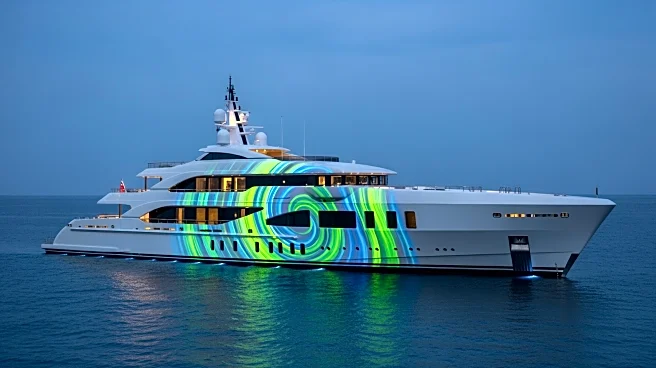What's Happening?
Activist group Climate Resistance recently conducted a direct action at London's Canary Wharf, using the superyacht Lady Christine as a platform to project messages advocating for taxation and climate
action. The yacht, owned by Scottish businessman Lord Irvine Laidlaw, was illuminated with slogans such as 'wealth tax now,' 'abolish billionaires,' and 'seize me.' Lord Laidlaw, known for his philanthropy and passion for offshore racing, has a history of owning large sailing yachts. The Lady Christine, a 68-meter vessel built by Feadship, underwent a significant refit in Australia in 2021. The action by Climate Resistance highlights their stance against economic activities associated with luxury yachts and the wealth they represent.
Why It's Important?
This action by Climate Resistance underscores the growing tension between climate activists and the super-rich, particularly regarding wealth distribution and environmental responsibility. By targeting a symbol of luxury and wealth, the group aims to draw attention to the need for more equitable taxation policies and climate action. The use of a high-profile yacht for this protest amplifies the message, potentially influencing public opinion and policy discussions around wealth taxes and climate change. The event also reflects broader societal debates on the role of the wealthy in addressing global challenges, such as climate change and economic inequality.
What's Next?
The protest may prompt further actions by climate groups targeting symbols of wealth and luxury. It could also lead to increased scrutiny of the superyacht industry and its environmental impact. Policymakers might face pressure to consider more aggressive taxation policies on the wealthy to fund climate initiatives. The superyacht community may respond by enhancing their environmental credentials or engaging in public relations efforts to counter negative perceptions.
Beyond the Headlines
The use of a superyacht for protest highlights the ethical and cultural dimensions of wealth in the context of climate change. It raises questions about the responsibility of the wealthy in contributing to environmental solutions and the societal implications of luxury consumption. This event could trigger long-term shifts in public attitudes towards wealth and environmental stewardship, influencing cultural norms and expectations around luxury and sustainability.










